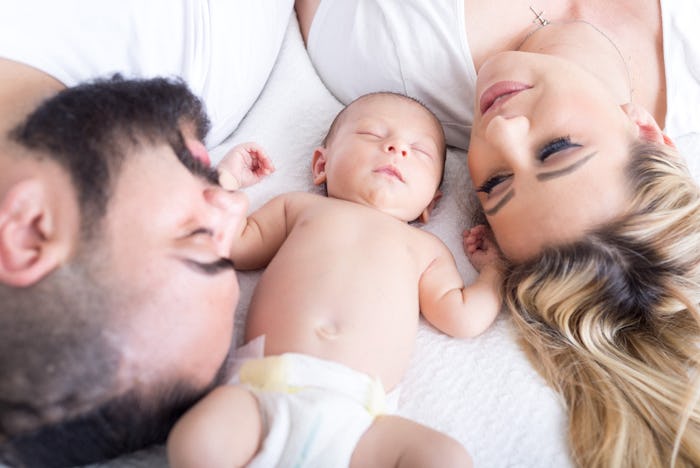Life

This Map Of Paid Leave Laws Around The World Is Pretty Infuriating — If You Live In The U.S.
For many working families, access to parental leave could mean the difference between stability and poverty. A large body of research has shown that paid leave not only benefits workers and their children, but also their employers. Yet, many new parents in the United States find themselves struggling to make ends meet while raising their children because of the country lacks a federal paid leave law. But that's not the case globally. Most developed nations offer public and private sector employees comprehensive benefits. Just take a look at parental leave laws around the world to understand how the United States fails its workers.
CapRelo, a global mobility and relocation management company, recently released an interactive map tracking maternity and paternity leave laws throughout the world. On the company's color-coded map, the United States is the only country shown in bright yellow, which represents the shortest (re: non-existent in America's cases) leave policy. Why? Because, among 41 developed countries, the United States stands alone as the one nation that doesn't have paid parental leave — or paid leave of any kind, for that matter — according to the Pew Research Center.
Compare that to Sweden, which offers new mothers and fathers 16 months of leave, respectively. Or Saudi Arabia, which offers up to 10 weeks of maternity leave and one day of paternity leave, both paid up to 100 percent of the employee's salary, according to CapRelo's map.
Here are the top five countries that blow paid leave laws out of the water.
Sweden
According to the official site of Sweden, the European country offers new mothers and fathers 480 days — or about 68 weeks — of parental leave. Under Swedish law, each parent has an exclusive right to 90 of those days. And, according to CapRelo's map, mothers and fathers are paid 80 percent of their normal salary for the first 390 days of leave, then a flat rate for the remaining 90 days. The country's paid leave policy also applies to parents of adopted children.
Bulgaria
Unlike Sweden, Bulgaria provides mothers and fathers with different leave times. According to Business Researcher, Bulgaria offers new moms up to 58 weeks of maternity leave, some of which is required to be taken prior to birth. But, as the CapRelo map shows, fathers in the Eastern European country only receive about two weeks of paid leave. Each parent, though, received 90 percent of their normal salary.
United Kingdom
The United Kingdom gives new mothers up to a year of paid maternity leave, with the first 39 weeks paid at 90 percent of their normal wage, according to the CapRelo map. Fathers, on the other hand, get between one to two weeks, either paid at a flat rate or at 90 percent of their salary, depending on which one is less. But, if working mothers choose not to take the full 52 weeks, they are required to take at least two weeks off — a month if they are factory workers, according to the U.K. government website.
Poland
Poland offers six months of leave to new mothers and two weeks of leave to new fathers, according to Maternity Action. But the number of weeks a new mother can take changes depending on the number of children you have; if you have quintuplets, you are entitled to 37 weeks of paid leave, according to the CapRelo's interactive map. Poland is also among the nations that are the most supportive with pay, giving parents 100 percents of their salary, according to CapRelo.
Estonia
Rounding out the top five countries with the most generous paid parental leave laws is Estonia. The Eastern European country provides new mothers with 20 weeks — or 140 days — of fully paid leave at 100 percent of their salary, while new dads get 10 days at 100 percent of their salary, according to Business Insider. On top of that, Estonian law also grants parents an additional 435 days of shared leave after maternity leave ends, which is paid according to the average of their two salaries.
In the end, every developed nation in the world far outpaces the United States when it comes to supporting new parents. And that's disastrous not only for American families, but for the businesses that operate within this country. The return on investment alone is worth providing parents with a much-needed benefit that only helps advance the United States' economy.
Check out Romper's new video series, Romper's Doula Diaries:
Watch full episodes of Romper's Doula Diaries on Facebook Watch.